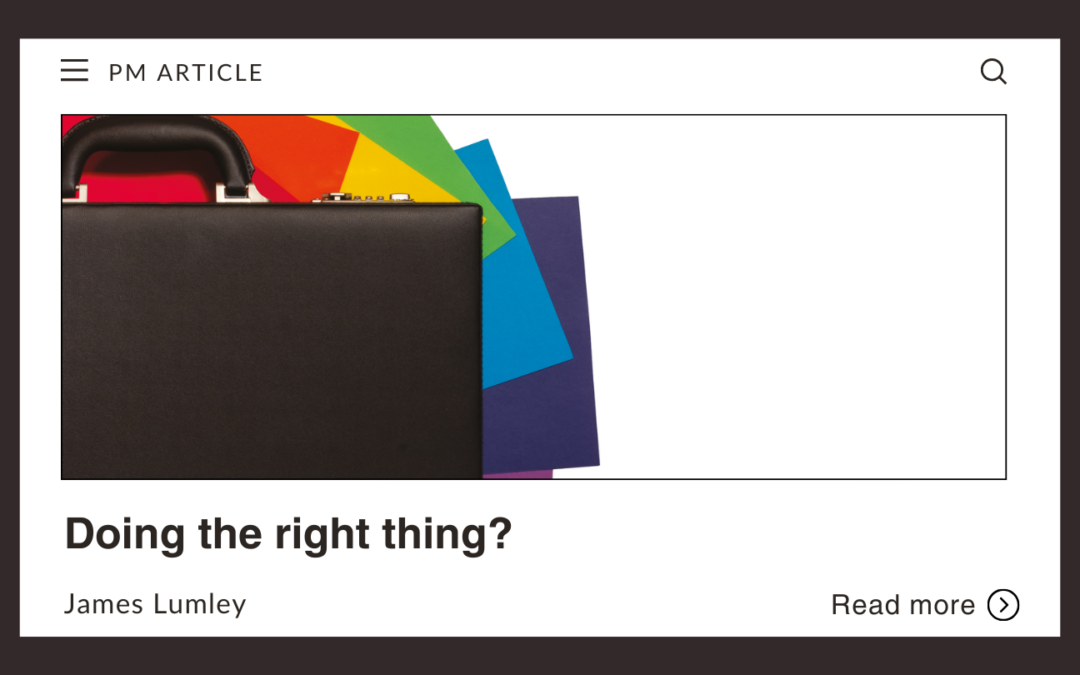Over the last few years, professional services firms have come under increasing pressure not just to do good, but to demonstrate that they are doing good both to their clients and to the world at large. How have they been doing this, and in what way is this impacting the roles of marketing and BD professionals? James Lumley finds out more.
When specialist consultancy Lamp House Strategy published its 2023 report on responsible business in the legal sector, it made a surprising finding.
Lamp House evaluated the responsible business strategies of 125 leading UK law firms. The leading firm wasn’t Freshfields. It wasn’t Slaughter and May, and it wasn’t Linklaters. It was Bristol-based Burges Salmon. Granted, Linklaters, Freshfields and Slaughter were in the top 5%, along with Addleshaw Goddard, Baker McKenzie and DWF. And Burges Salmon is no minnow. It’s a regional powerhouse with an established national practice and revenues in excess of £100 million. Even so, the fact it did better than international firms 20 times bigger is notable.
It shows, says Lamp House’s Hayley Fothergill, that responsible business strategies have much more to do with mindset than resources.
“When we speak to businesses about responsible business strategies, some of them tell us that they shouldn’t be compared to the biggest firms. But we can point to Burges Salmon. It isn’t a big international law firm, but it has come top of our list.
“That is because all firms have choices open to them, and Burges Salmon has chosen to focus on responsible business practices and be serious about it. So, it really comes down to one thing: as a firm, are you going to commit yourself?”
Focus on the S and the G
But commit yourself to what? Law firms and accountancy practices have long been involved in pro bono work. We’ve all been turning off the lights, thinking before printing (on both sides), and recycling at home and in the office for years now. Diversity policies are in place in most businesses, and we are all aware of the gender pay gap. Add to that the ever-changing nomenclature, from sustainability to ESG and CSR. What is a firm supposed to do?
Jo Goddard, who runs sustainability consultancy Green & Good Consulting agrees that it can be confusing and the pathway for every business will be different. But there are broad principles that will apply to most professional services firms.
Firms should look at how they impact the environment (E) and society (S) and then consider their own corporate governance structures (G) and work out how they can be improved to make a positive difference to the world, rather than a difference to the firm’s profitability. Or, in ESG language: what is most ‘material’?
“Professional services don’t, for example, directly deal with chemicals or drill for oil, so dealing with the ‘E’ is, in terms of their own carbon footprints, relatively straightforward,” Goddard says.
“One of the biggest components here is likely to be business travel.”
“They should have a policy about climate change, and there are lots of ways to be creative, but where they can likely make the most difference is in the S and the G – the advice they give to their customers and suppliers about becoming more responsible businesses, how they treat their own people, and what they can do in the community to, for example, improve social mobility.”
Many firms are well on the way to doing much of this because they simply think it is the right thing to do, and there is a good business case to do it, according to Neha Sawjani, co-founder & Director of Purpose & People at the Wonder Consultancy.
“I’ve been working on responsible business with professional services firms for about 15 years now, and things have changed,” she says. “Legislative, investor and workforce pressure are driving change. At Wonder consultancy, we help firms simplify what this looks like. Doing good doesn’t have to be complicated or cumbersome and small changes can make a big impact.”
“At its simplest, clients increasingly want to buy services from businesses who do good in the world, rather than do bad. And firms have responded in various ways.”
“For example,” she says, “we are seeing real shifts when it comes to sustainability, gender and race, and social mobility. There is a strong focus around future-proofing talent acquisition and firms are increasing the number of innovative programmes to recruit people from many backgrounds.”
This, she points out, is enlightened self-interest – which is no bad thing. Professional services firms’ most important resource is their people. Most firms have got the memo that diverse teams make better decisions, so investing in DV&I is a logical response to talent recruitment and retention.
There is also another very important reason to demonstrate your positive impact. Clients don’t just increasingly like buying services from businesses that do good. Their own responsible business policies compel them to.“Supply chain pressure is very, very real,” says Sawjani. “Firms that don’t respond to it will simply lose business.”
It’s a journey
The word ‘journey’ crops up often in discussions about responsible business practices. Changing strategies and structures takes time. What does this journey look like?
Surjit Deuer is the Senior ESG Manager for national law firm Mills & Reeve. In her opinion, while mid-tier firms might lag behind some of the bigger players, they are fast catching up.
“While ESG is not new, the pressure for business to change is intensifying all the time,” she says. “Professional services firms constantly have to prove their ESG credentials to clients, and on top of that, the persistent ‘war for talent’ remains a significant factor. Employees and future talent want to work for businesses that have a real purpose.”
The firm is committed to embedding responsible business practices. This is very much led from the top and driven by its dedicated ESG team.
“It is no secret that the S in ESG hasn’t been great at law firms,” she says, citing lawyer burnout statistics and diversity challenges.
“But we had a head start because we have a great culture. We’ve been consistently ranked on the Best Places to Work list for 20 years and on the Roll On Friday list. On top of that, we are making great strides in reducing our carbon footprint and are proud to have launched our second sustainability report this month.
“Much of the focus to date has been on getting our own house in order. That was important to us. I feel we have a good handle on that and so the client piece is my big focus now.”
By that Deuer means “being able to support our clients on their ESG journeys”.
This, she says “is one of the biggest material impacts that we can have”. Law firms, through their advice, are uniquely placed to help clients to become more environmentally and socially sustainable.
The role of BD
And the reason why Deuer is well placed to do this is that, prior to taking on her ESG role, she led the firm’s business development team.
“I have the external view from my previous role,” she says. “As a BD professional, I’ve been constantly involved in client listening programmes to ensure the client voice is central to everything we do. From this, I know where they are in their ESG journey.”
Further marketing and BD skills come into play as this strategy is developed.
“BD and marketing teams have a real bird’s-eye view of the business,” she says. “We work across sector and legal services groups, as well as across finance, HR, Risk etc, so there is so much that marketing and BD teams can do to connect the dots to truly embed ESG.”
One job is “educating the business” to make sure lawyers are on board and can talk about ESG with their clients.
There is, she points out “no such thing as ESG law”. Instead, all lawyers need to understand what ESG means for clients and be equipped to spot the opportunities and risks that it presents. This means considering all legal advice through an ESG lens.
Laura Klysz, the Global Head of Marketing and Communications at Simmons & Simmons, emphasises the firm’s commitment to becoming “a next generation law firm,” which means, she says, ESG has been a pivotal consideration for some time.
The firm recognises the positive influence and impact it can make, not only for clients and their employees, but for society and the planet too.
Klysz notes the crucial role that marketing and business development teams can play in propelling the firm’s ESG strategy, both in client interactions and within the firm’s culture. “It’s imperative that the firm’s communications are authentic and transparent, whilst avoiding the pitfalls of greenwashing.”
However, she also warns against ‘greenhushing’. Upon engaging with the Lamp House study and providing detailed insights into their ESG strategy and business practices, Simmons & Simmons’ ranking improved significantly.
“We learned that we need to be bolder in sharing what we are doing. Not just through our client-focused ESG practice but across the whole spectrum of our legal work and internal initiatives. The journey towards ESG excellence is ongoing and complex and we aren’t going to get it right all the time. Some decisions aren’t always black and white, but the work we do really matters and so, by sharing our story, hopefully we can inspire and set an example for others to follow.”
And that is a job that marketing and BD professionals are well qualified to do.




